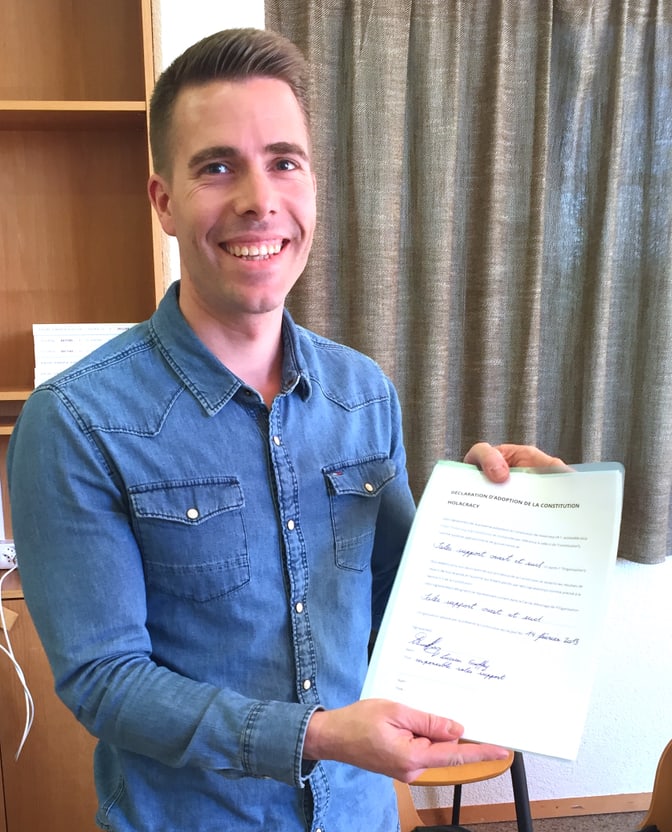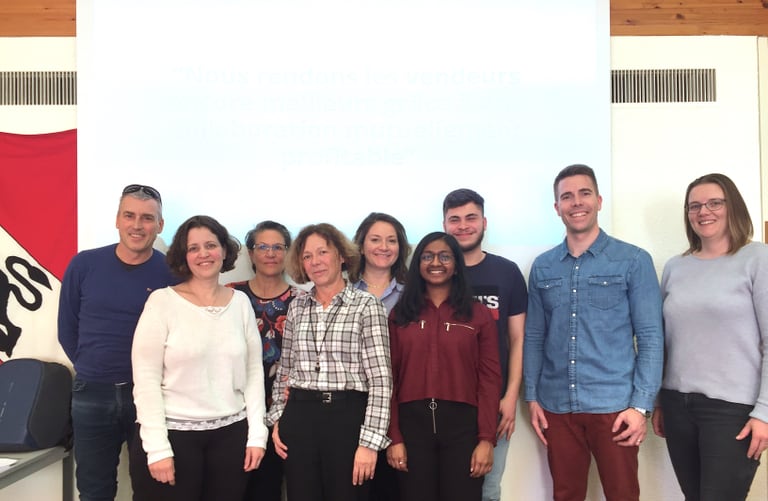At the end of the kick-off meeting in January 2019, Lucien Ecoffey – the then Head of French- and Italian-speaking Switzerland’s PostLogistics Sales Support body – signed the Holacracy® Constitution. He gave up his hierarchical authority and transferred it to the process that would guide his entire team.
Six months after this transformation began, the former manager and now Lead Link of the PostLogistics Sales Support circle takes a look back at the successful transition.
How did this transition project to Holacracy® happen?
Lucien Ecoffey: We had an internal reorganisation in 2017. At this point, we established a service unit providing back-office services to various divisions of Swiss Post. This change affected how we worked. We needed a more flexible structure to meet the various demands of our different stakeholders. In addition, the members of my team expected more autonomy, more responsibility and less monitoring.
Why did you choose Holacracy®?
For three reasons:
- I was convinced that Holacracy® represents democracy applied directly to a company.
- The members of my team wanted to play a bigger role in decision-making.
- Another team within Swiss Post had already successfully implemented Holacracy®.
The team voted, and Holacracy® was the unanimous choice.
The Constitution and the clear tools and processes enable us to oversee the quality of management. Holacracy® also enjoys a high level of credibility. In addition, there are various pieces of associated software available, such as Holaspirit.
Organising work by roles rather than sets of specifications was an attractive prospect for all team members. These roles develop in line with the changes we face, something that is perfect for our need for flexibility. The members also appreciate that the autority is given by a set of rules and not by a single person any more.

What would you say are the benefits of implementing Holacracy®?
Each member of the team is more deeply involved, in particular at tactical and governance sessions. Our meetings have become increasingly efficient. All problems are presented at the meeting and tackled immediately: decisions are taken, and everyone is involved. This new decision-making process also means that I no longer have to decide everything, and it has given me more respect for my colleagues’ opinions.
We are still at the learning stage. Everyone requires an adjustment period to fully incorporate the new responsibilities of a role into their work and learn how to manage the authority that comes from this. Clarifying these responsibilities and grouping these within specific roles has already been of great benefit. This enables everyone involved to examine their activities and optimise their tasks. Team members’ ability to identify with their roles is also a key benefit of this transition.
Holacracy® has another benefit, namely transparency. For example, we can integrate a new member of staff into the team easiler and faster. Processes, responsibilities and tasks are clear and transparent.
What did you think of Liip's coaching?
Your accompaniment into Holacracy – four days spread across six months – completely met our expectations. Laurent and Jonas did outstanding work.
The kick-off was intense but absolutely necessary, and it gave the team a new way of looking at hierarchy. I remember the rather formal moment when I transferred my authority over to the Constitution. I also enjoyed working on our circle's purpose and creating the first roles.
During this kick-off, you gave us the tools that would enable us to work with Holacracy®. The coaching showed us that we could view authority from a different angle. It took us out of our comfort zone and enabled us to optimise the roles within our team.
You have been working with Holacracy® since the beginning of the year. What are your plans for the future?
Our work with Holacracy® is only just beginning. It is great to see that it really works. The next step is to incorporate the idea of roles and people being separate from each other. Current roles will be developed (some will be wound up and others created) to bring them closer to our daily work. We still need to learn how to handle some tools to enable this structure to become a source of fulfilment, for each employees personal benefit.
The transition taking place within our team has piqued the company’s interest and been well viewed. Numerous other teams are beginning a similar process.
I think this is fantastic, and hope that Swiss Post as a whole will move in the same direction.
I would therefore be delighted if Liip comes back to see the progress we have made, coach us on the aspects we need to improve, and share our experiences.

